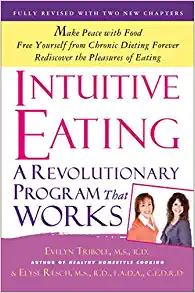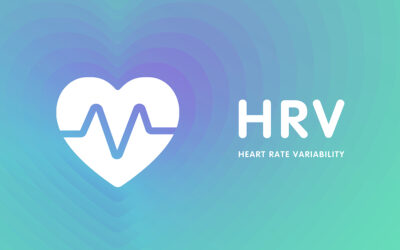Principle 1: “Reject the Diet Mentality.”
Intuitive eating is a new way of thinking, feeling, and being with food. In order to become an intuitive eater the diet mindset must be broken.
Dieting creates a vicious cycle: Desire to be thin – Dieting – Cravings and Reduced Self Control – Loss of Control and Overeating – Regain of Lost Weight – Desire to be Thin…
The “Intuitive Eating” program recommends the following steps to release you from endless dieting.
- Step 1: “Recognize and acknowledge the damage that dieting causes.”
- Step 2: “Be aware of diet-mentality traits and thinking.”
- Step 3: “Get rid of the dieter’s tools.”
Principle 2: “Honor Your Hunger.”
Listen to the hunger signals from your body and eat when they appear. Waiting to eat until you are ravenous will only lead to bad choices and excess calories.
Some people tell me they do not feel hungry. To help develop these signals eat every 3-4 hours. Your body should respond to this regular feeding schedule and begin to expect it, providing hunger cues.
Principle 3: “Make Peace with Food.”
“Call a truce; stop the food fight! Give yourself unconditional permission to eat. If you tell yourself you can’t or shouldn’t have a particular food, it can lead to intense feelings of deprivation that build into uncontrollable cravings and, often binging.”
Principle 4: “Challenge the Food Police.”
Let go of the “good” and “bad” judgments you make about food. This is only perpetuating the diet rules and reinforcing the relationship between eating and guilt. Combat the food police with the following actions.
- 1: “Identify your distorted food, dieting, and eating thoughts and myths. Throw them out and replace them with the truth.”
- 2: “Listen for the destructive voices which speak harmful thoughts.”
- 3: “Develop helpful voices that can get you through hard times and make your eating relationship more comfortable.”
- 4: “Watch out for negative self-talk based on […] irrational beliefs and distorted thinking.”
- 5: “Replace negative self-talk with positive self-talk based on rational thinking.”
Principle 5: “Feel Your Fullness.”
Use “The Fullness Discovery Scale”: 0-empty; 2-ravenous; 3-Set; 4-Pangs; 5.5-Neutral; 6.5-Satisfied; 8-Full; 9-Stuffed; 10-Sick. Strive to stop eating when you reach satisfaction 6-7 on the scale. Make sure to check in with your body regularly during a meal to evaluate your ranking.
Principle 6: “Discovery the Satisfaction Factor.”
“The Japanese have the wisdom to promote pleasure as one of their goals of healthy eating. In our fury to be thin and healthy, we often overlook one of the most basic gifts of existence – the pleasure and satisfaction that can be found in the eating experience. When you eat what you really want, in an environment that is inviting and conductive, the pleasure you derive will be a powerful force in helping you feel satisfied and content. By providing this experience for yourself, you will find that it takes much less food to decide you’ve had ‘enough’.”
Principle 7: “Cope with Your Emotions Without Using Food.”
Often we eat not due to physical hunger but in response to an emotional trigger such as boredom and procrastination, bribery and reward, excitement, soothing, love, frustration, anger and rage, stress, anxiety, mild depression, and being connected with others. Next time you are eating not because of hunger ask yourself these questions.
- 1: “Am I biologically hungry?”
- 2: “What am I feeling?”
- 3: “What do I need?”
- 4: “Would you please…(asking for what you need)?”
Principle 8: “Respect Your Body.”
The premises of body respect:
- 1: “My body deserves to be fed.”
- 2: “My body deserves to be treated with dignity.”
- 3: “My body deserves to be dressed comfortably and in a manner I am accustomed to.”
- 4: “My body deserves to be touched affectionately and with respect.”
- 5: “My body deserves to be comfortable.”
Continuously depriving yourself of food, comparing your appearance to others, only noticing what you don’t like about your body, and wearing tight, uncomfortable clothes is disrespecting your body and yourself.
Principle 9: “Exercise- Feel the Difference.”
Instead of viewing exercise as punishment and something that must be done to lose weight focus on how exercise makes you feel – energized, improved outlook, less stressed, in control… Exercise is fun! It is one of the best ways you can take care of yourself. Changing your approach to exercise from a “should” to a “want” can improve your motivation and commitment.
Principle 10: “Honor Your Health – Gentle Nutrition.”
“Make food choices that honor your health and taste buds while making your feel well. Remember you don’t have to eat a prefect diet to be healthy. You will not suddenly get a nutrient deficiency or gain weight from one snack, one meal, or one day of eating. It’s what you eat consistently over time that matters. Progress, not perfection, is what counts.”




